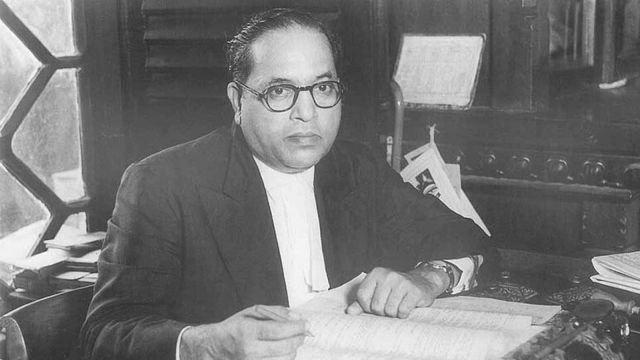

New DelhiDec 6, 2024 14:40 IST First published on: Dec 6, 2024 at 14:40 IST
Babasaheb Ambedkar’s intellectual legacy and revolutionary spirit have been pivotal in shaping India’s socio-political landscape. However, his evolving public image as a nationalist hero or even as an intellectual figurehead raises critical concerns about how his contributions are perceived and utilised today. Ambedkar’s struggle to liberate the “untouchables” from the clutches of Brahmanical servitude was shaped by organising multiple heroic struggles, challenging the mundane routine of discrimination and alienation under which the oppressed social groups were suffering. While Ambedkar as a populist national icon is important, such grand symbolisms are often curated to distance him from the ongoing struggles of oppressed communities.
After Independence, Ambedkar’s influence was primarily confined to Dalit-Bahujan communities in states like Maharashtra, Uttar Pradesh and Tamil Nadu. This exclusivity began to shift in the late 1980s with the rise of Mandal politics and the Bahujan Samaj Party (BSP) in Uttar Pradesh. Today, Ambedkar is no longer limited to being called the “Dalit messiah”. His ideas on social justice, human rights, Buddhism and constitutionalism have entered mainstream discourses, elevating him as a global social revolutionary, an important nationalist leader, and a famed political philosopher.
While this expanded recognition appears democratising, it often sidelines the very issues Ambedkar fought for. The grand state-sponsored celebrations of his legacy (like erecting big statues and national memorials), frequent political invocations of his name (as witnessed in the recent assembly elections in Haryana and Maharashtra), and increasing references to his constitutional contributions, elevating him as a nation builder, risk reducing Ambedkar to a symbolic figure. Such heightened appropriation distracts from pressing issues such as caste-based violence, economic marginalisation, and systemic exclusion of Dalits and Adivasis from positions of power.
Ambedkar’s struggles against untouchability and the oppressive Brahmanical caste order defined his life’s mission. His goal was not just nation-building or constitutional reforms but to radically transform the caste-ridden social order. His historic battles — whether demanding access to the Mahad water tank, campaigning for Dalit re-entry into military services, or raising awareness through newspapers—are often sidelined in favour of a sanitised, politically convenient version of his identity. Especially, his engagement with working-class politics in Bombay as a labour leader — where he fought impressive battles to secure equal wages, pensions and paid holidays for workers — garnered limited attention in the populist framework.
In academic circles, he is increasingly viewed as a philosopher of justice and equality. The recent biographical sketches by brilliant academic minds have delved deep into his intellectual writings, decoding new meanings and substances. Though such attempts are praiseworthy, they lack the needed relationship with ongoing struggles for social justice and liberty. The intellectual curation of Ambedkar as a nuanced entity divorces him from the people who need his thoughts to challenge their perpetual servitude. There is an insufficient emphasis on his relentless fight against caste discrimination, class inequalities and the hegemony of the nationalist leadership of upper caste elites. This trend often alienates Ambedkar from engaging with everyday social struggles in a meaningful way. The recent attempts to present him as a nationalist philosopher or an abstract global thinker thus subtly dilute his revolutionary essence.
The neoliberal era has only exacerbated these challenges. Dalits and other marginalised communities face increasing exclusion from the benefits of economic growth, while Dalit political movements have struggled to mount effective challenges against the ruling elite. Dalit social mobilisations are often restricted to symbolic rituals rather than addressing structural inequalities, especially the issues of caste-based atrocities, rape, violence and social ostracisation. The new elevation of Ambedkar as a philosopher or nationalist hero appears to be alienated from such everyday tragedies.
most read
Celebrating him merely as a national icon while ignoring his core ideological struggle for equality and justice is a disservice not just to Ambedkar but also to the communities he tirelessly worked to uplift. The numerous social and political struggles by Dalits, Adivasis and other marginalised social groups require an Ambedkar that examines their precarious conditions and inspires them to launch a fierce battle against the conventional ruling elites. Ambedkar’s teachings offer powerful tools to confront the socio-economic marginalization of oppressed groups. His ideas should serve as a revolutionary resource, reigniting the fight for equality and dignity for all.
The solution lies in reclaiming Ambedkar’s legacy for what it truly is — a radical call to action against caste hierarchies, social injustices, and economic exploitation. Recovering the true essence of Babasaheb Ambedkar means embracing his ethical objectivity and revolutionary zeal. By doing so, we honour not only his intellectual brilliance but also his unwavering commitment to a just and egalitarian society.
The writer is assistant professor, Centre for Political Studies, JNU


